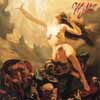Rolling Stone April 21, 1994
by John McAlley3.5/5 Stars
To study Milla Jovovich's face at age 12 was to confront a Lolita even Nabokov could not have imagined. The Russian-born model projected an intensity that was smoldering and mysterious. Her inscrutable pose hinted at unknowable depths - and made you hunger for a glimpse of that knowledge.
That said, it remains a stunning surprise to discover the stylistically exotic and all-out soulful The Divine Comedy, Milla's remarkable recording debut. Now 18, all American and would-be poster girl for the X crowd, she is no crossover opportunist or vacant pretender. She is a natural poet and melodist. Produced by Rupert Hine and Richard Feldman, The Divine Comedy is strikingly mature and rich in invention, counterpointing Milla's lovelorn, angst-laced poetry with vivid melodies and arrangements that find a common spirit in synth pop, European folk and psychedelic dream rock. Chiming dulcimers, sawing fiddles, mandolins, harmoniums and hurdy-gurdies coalesce in atmospheric settings that are alternately dramatic, exultant and carnivalesque.
Milla's post-mortems of failed love affairs ("Gentleman Who Fell", "It's Your Life") and spasms of existential grief ("Clock") are free of neurosis and gratuitous detail. That life's a bitch is a given for Milla's generation, and this fluent relationship with crisis informs her blunt verse, airy vocals and overall precociousness. "No, I haven't seen the flowers yet/From the broken seeds I'd planted/But the ground is still too red/From the wickedness you did," she sings with lite vulnerability on "You Did It All Before". "Ruby Lane" and "Bang Your Head" cut their grim messages with arrangements that are - as the titles suggest - trippy fun. And on "Charlie", Milla - whose voice synthesizes two obvious influences, Kate Bush and Sinead O'Connor - dismisses a junkie boyfriend with Dietrichlike whimsy: "Oh Charlie, a boy and his toys/Hands could never comfort you, not the way that steel could do."
Dante's Divine Comedy chronicled a turbulent journey through the afterlife. Milla, like the rest of us, is stuck negotiating the far-too-harrowing here and now. Still, she has had the imagination to turn her dark visions into music of idiosyncratic beauty. Therein lies the solution to the mystery: What was lurking behind young Milla's smoldering eyes? The burning intelligence of an artist.
